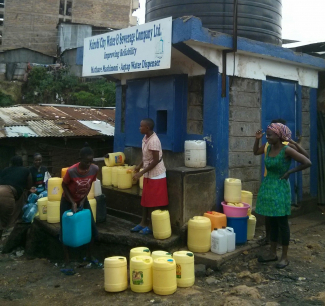Capacity Building on the Development of a Socially and Gender-Inclusive Payment for Ecosystem Services Guidelines in Kenya’s Water Sector
Intro This project seeks to capacity build the policymakers and EFD Kenya researchers to develop and implement a socially and gender-inclusive policy guidelines for payment for ecosystem services (PES
Benchmarking South African water utilities using three efficiency analysis methods
This paper compares efficiency scores from the data envelopment analysis (DEA), stochastic frontier analysis (SFA), and stochastic non-parametric envelopment of data (StoNED) methods in the context of regulating South African water utilities. We estimate cost efficiency based on cross-sectional data from 102 South African water utilities in the period 2013/14. We compare the impact of methodological choices on the efficiency scores. For StoNED, we compare scores from two different estimation techniques (method of moments and pseudolikelihood).
Improving payment for essential services – A field experiment in Nairobi, Kenya
Abstract: Utilities across the global require stable revenue streams to provide customers access to high quality energy, water, sanitation, and other essential services. This requires policy makers to set prices to cover costs, promote the efficient use of resources, and ensure services are affordable. It also requires that customers pay their bills. Historically, utilities have used disconnections, or the threat of disconnection, to compel customers to pay their bills on time.
Collaboration between researchers and water company - winning recipe for impact
A team consisting of EfD Kenya, international associates, and the Nairobi City Water and Sewer Company has, over the last decade, collaborated to solve challenges related to providing and funding
Still Waters Run Deep: Groundwater Contamination and Education Outcomes in India
This study investigates the impact of groundwater contamination on educational outcomes in India, using variations in the geographical coverage and timing of safe government piped water schemes. The study is based on survey data from public schools in Assam, one of India’s most groundwater-contaminated regions. It is found that prolonged exposure to unsafe groundwater is linked to increased absenteeism, grade retention, and lower test scores and CGPA. Additionally, the researchers use a nationally representative household survey to study the effect of arsenic contamination.
Evolving pathways towards water security in the Vietnamese Mekong Delta: An adaptive management perspective
The interplay of climate change, upstream hydropower development, and local water engineering interventions for agricultural production contributes substantially to the transformation of waterscapes and water scarcity in the Vietnamese Mekong Delta. This paper aims to examine how these dynamics are linked to the paradigm shift in water management in An Giang and Ben Tre, the two ecologically distinct provinces that face serious water scarcity in the delta.
Pagination
- Previous page
- Page 2
- Next page


